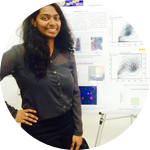About This Project
Immunological processes influence the development and vitality of every organism. The tobacco hornworm, Manduca sexta, is one such invertebrate insect whose hemocytes, which are blood cells, play a role in phagocytosis of foreign molecules when they encounter damaged tissue or infection. Tissue damage caused by x-ray irradiation causes developmental delay in M. sexta (Fuse Lab, unpublished data). I study these effects during wing development precursor cell regeneration.
Ask the Scientists
Join The DiscussionWhat is the context of this research?
Physiological injury via irradiation of imaginal discs causes developmental delays (Madhavan et al. 1977) in holometabolous insects such as the fruit fly, D. melanogaster (Katsuyama et al. 2012, Worley et al., 2012), and the hornworm, Manduca sexta (Hong and Omondi, unpublished). This is putatively to provide time for the imaginal discs to regenerate. It has been shown that the immune response is altered after imaginal disc damage in fruit flies, but has not yet been studied in M. sexta. The goal of this project is to track immune responses after imaginal disc damage, during its regeneration period. We will monitor system-wide and localized hemocyte population changes, as well as the susceptibility to infection after tissue damage.
What is the significance of this project?
It will be an interesting comparative study to assess the effects of radiation and infection during imaginal discs regeneration in M. sexta. Resolution of hemocyte response under these conditions is of great significance to (1) better understand the immune system’s effects on tissue regeneration in the invertebrate Lepidopteran system and also (2) unravel the co-modulatory effects of hormone and immune signaling cascades that have been conserved in Lepidopterans throughout evolution. Manduca is less studied as a molecular model that allows us to discover its physiological characteristics and qualify it as a representative of the invertebrate immune system.
What are the goals of the project?
1. To characterize the circulating hemocytes after tissue damage, circulating hemocyte population shifts will be determined using a Becton-Dickinson FACS Calibur fluorescence activated cell sorter, and corroborated comparatively with a hemocytometer. I will track blood cell populations in four intervals during a 48-hour period post xray irradiation.
2. To characterize the localized hemocytes after tissue damage, I will measure hemocytes using a hemocytometer and via immunostaining.
3. To assess the immune response after bacterial infection in M. sexta with damaged imaginal discs, I will infect the Manduca larvae with the Micrococcus luteus 6h after they are irradiated and measure the hemocyte response by collecting hemolymph.
Budget
I am an international student without any scholarships. Currently, our institution is limited on funding for Biology students, thus our lab is confined to funding solely made possible by generous grants provided by outside sources. Moreover, my PI’s grant has just ended, and thus we are currently not at all funded.
The budget will be used for materials and equipment used regularly for my experiments. Antibodies, dyes, and solutions are regular expenditures with regard to my experiments. Antibody staining will be the majority of expenses, as well as proteomics via performing protein gels. The successful findings of the experiments will be crucial to fulfilling my Master’s thesis dissertation by December 2016 and also pave a strong immunological perspective to employ further studies in the model organism.
Meet the Team
Rachel Bhaskar
I am a graduate student in Microbiology at San Francisco State University. For my Master’s project, I have chosen to work with invertebrate model organisms to understand how immunological processes work in insects. Moreover, I am fascinated by the robust innate immune system of these insects which can survive lethal doses of radiation and even some types of infection. Outside of research, I enjoy travelling to new places, sometimes by hiking and kayaking.
Project Backers
- 2Backers
- 1%Funded
- $10Total Donations
- $5.00Average Donation
